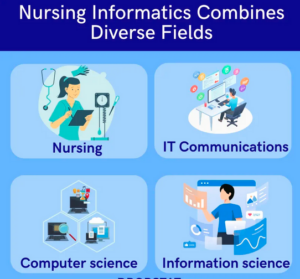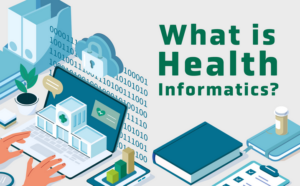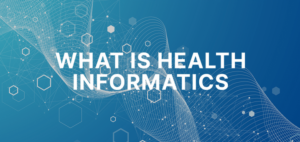Walden’s MSN Specialization in Nursing Informatics
 Overview: The Nursing Informatics specialization is designed to help nurses harness the power of technology and data management to improve patient care outcomes.
Overview: The Nursing Informatics specialization is designed to help nurses harness the power of technology and data management to improve patient care outcomes.
By blending nursing science with information technology (IT) and healthcare technology, this specialization empowers nurses to effectively use electronic health records (EHR) systems, health data management, and other tools to enhance patient care delivery and decision-making.
The MSN in nursing informatics provides students with the skills and knowledge to excel in healthcare IT jobs, and effectively integrate nursing technology solutions in healthcare settings. Through a comprehensive nursing informatics curriculum, this program prepares graduates to play an essential role in the evolving landscape of health informatics.

Struggling to meet your deadline?
Get your assignment on Walden’s MSN Specialization in Nursing Informatics done by certified MDs and PhDs in the USA. ORDER NOW!
What You Will Learn in the MSN Nursing Informatics Program
The MSN Nursing Informatics program will teach you how to combine your clinical nursing experience with information technology to manage healthcare data, improve patient care, and support better healthcare outcomes. You’ll learn about the role of informatics nurses in enhancing healthcare IT systems, including electronic health records (EHR) implementation and clinical informatics. This degree helps you develop expertise in managing Big Data in healthcare, applying evidence-based nursing informatics, and ensuring the security and privacy of sensitive health information.
Core Courses in the Nursing Informatics Specialization
The nursing informatics degree includes a series of core courses designed to build your knowledge and skills in key areas such as:
- NURS 6401 – Informatics in Nursing and Healthcare (5 credits)
This course provides the foundation for understanding the essential role of nursing informatics in improving healthcare practices and policies. You’ll explore how nursing informatics roles contribute to patient safety and quality care. - NURS 6412 – Information and Knowledge Management (5 credits)
Learn how to manage health data efficiently, including data analytics and healthcare technology tools. The course covers how to handle large volumes of data and use it to improve patient care. - NURS 6421 – Supporting Workflow in Healthcare Systems (5 credits)
Nurses need to understand how information systems support workflows. This course teaches you to design and implement systems that optimize nursing informatics in practice, including workflow analysis and the integration of Electronic Health Records (EHR). - NURS 6441 – Project Management: Healthcare Information Technology (5 credits)
Project management skills are critical for managing healthcare technology initiatives. You will learn the fundamentals of managing healthcare IT projects, focusing on implementing and maintaining EHR systems. - NURS 6451 – Evaluation Methods for Health Information Technology (5 credits)
This course focuses on evaluating the effectiveness of healthcare IT systems to ensure they meet standards and improve patient outcomes. You’ll learn how to assess the success of nursing informatics solutions and refine their application. - NURS 6461 – Capstone Synthesis Practicum (5 credits: 2 credits didactic; 3 credits practicum)
In your final course, you will apply what you’ve learned through a practicum experience and a final project, gaining hands-on experience in real-world healthcare settings. You’ll work on improving healthcare systems and patient care through nursing informatics.
Career Opportunities in Nursing Informatics
A Nursing Informatics degree opens up numerous career opportunities in healthcare IT jobs, including roles such as:
- Informatics Nurse
- Clinical Informatics Specialist
- Health IT Project Manager
- Health Data Analyst
- Electronic Health Records (EHR) Specialist
Graduates of the program are in high demand, as they have the skills to manage and analyze healthcare data, implement technology solutions, and support improved decision-making in healthcare settings.
Why Choose Walden’s MSN in Nursing Informatics?
Walden University’s online MSN in Nursing Informatics is designed for working professionals who need the flexibility to balance their studies with personal and professional responsibilities. The program offers a robust curriculum focused on real-world applications of nursing informatics and prepares students to take on leadership roles in the healthcare industry. Through this program, you’ll gain in-depth knowledge of healthcare technology, patient care technology, and health informatics.
Required Prerequisites for the Nursing Informatics Specialization
Before enrolling in the Nursing Informatics Specialization, students must complete the following prerequisites:
- NURS 6002 or NURS 6003
- NURS 6050
- NURS 6051
- NURS 6052
- NURS 6053
These foundational courses ensure you have the necessary background in nursing practice and research to succeed in the informatics specialization.
The Role of Nursing Informatics in Improving Patient Care
Nursing informatics plays a pivotal role in improving patient care by providing nurses with the tools and knowledge to leverage healthcare technology. With the integration of electronic health records (EHR) and nursing technology solutions, informatics nurses help streamline workflows, reduce errors, and improve communication between care teams. By applying evidence-based nursing informatics, these professionals help ensure that patient care is more accurate, efficient, and personalized.
Skills You Will Gain in Nursing Informatics
Throughout the MSN in Nursing Informatics, you will acquire valuable skills in areas such as:
- Health data management and analytics
- Healthcare IT project management
- Implementation of Electronic Health Records (EHR)
- Evaluating healthcare technology for quality improvement
- Integrating nursing practice with information systems
- Using Big Data to enhance patient care and outcomes
These skills are critical for those interested in advancing their careers in healthcare technology and nursing informatics roles.
Certification and Career Advancement in Nursing Informatics
Upon completion of the Nursing Informatics certification, graduates can pursue advanced certifications such as the American Nurses Credentialing Center (ANCC) Informatics Nursing Certification. Certification enhances career advancement opportunities, leading to higher-level roles in healthcare IT project management, clinical informatics, and health data management.
Program Overview: Flexible Online Learning at Walden University
Walden’s online nursing papers program allows students to earn their MSN in Nursing Informatics while balancing their professional and personal commitments. The program’s online nursing essays format provides the flexibility needed to succeed in today’s busy healthcare environment. Students can interact with peers and faculty, complete assignments, and gain hands-on experience with real-world nursing informatics applications.
Healthcare Technology & Nursing Informatics: The Future of Patient Care
As the healthcare industry increasingly turns to technology solutions to address challenges, the role of nursing informatics becomes even more essential. Big Data in healthcare offers new opportunities to personalize care, improve outcomes, and streamline processes. The integration of healthcare technology with nursing informatics will continue to shape the future of patient care, making it more efficient, data-driven, and patient-centered.
Nursing Informatics and Health Data Management
Health data management is one of the most critical aspects of nursing informatics. Nurses trained in this field are skilled at handling large datasets, ensuring data integrity, and using this information to improve decision-making. Courses like NURS 6412 – Information and Knowledge Management focus on these essential skills.
Real-World Applications of Nursing Informatics in Healthcare Settings
The principles of nursing informatics are applied in many healthcare settings, from hospitals to clinics to public health organizations. As an informatics nurse, you will work with interdisciplinary teams to implement and refine nursing technology solutions that enhance care delivery. You’ll also participate in EHR implementation and ensure that healthcare IT systems are optimized for better patient care.
Big Data and the Impact of Nursing Informatics on Healthcare
The explosion of Big Data in healthcare presents both opportunities and challenges. Nursing informatics plays a critical role in managing and analyzing this vast amount of data to extract meaningful insights that drive improvements in patient care. Nurses with expertise in informatics are positioned to help healthcare organizations make the most of this data to enhance the quality of care and streamline operations.
How to Apply for the MSN Nursing Informatics Specialization
To apply for the MSN Nursing Informatics Specialization, you must meet the program’s prerequisites and submit an application through Walden University’s online portal. Detailed instructions, including required documents, are available on the university’s website. Once accepted, you can begin your journey to becoming a leader in nursing informatics and healthcare technology.
This MSN in nursing informatics is an excellent opportunity for nurses to gain expertise in healthcare IT, nursing informatics certification, and patient care technology, ultimately positioning themselves for leadership roles in the healthcare sector.
Walden’s MSN Specialization in Nursing Informatics
The Nursing Informatics specialization equips nurses with the skills to make better use of information technology to improve the quality of patient care. This specialization combines nursing science with computer and information science. The coursework centers on critical areas like information systems, database concepts, and efficient project management. Graduates are equipped with the expertise to bring together data, information, and knowledge to aid decision-making that impacts both patients and healthcare providers. (Additional software may be needed for some components of the program.)
Specialization Courses (30 credits)
NURS 6401 – Informatics in Nursing and Healthcare (5 credits)
In this course, students lay the foundation for understanding and practicing nursing informatics in healthcare settings. They develop a deeper understanding of how the field of informatics is playing a vital role in reshaping healthcare practices and policies. This involves exploring the various functions of nurse informaticists. Students also delve into the models and theories that underpin nursing informatics and investigate the use of information technology to enhance decision-making for safe and high-quality patient care. They learn to address concerns related to information security and system reliability. Throughout the course, students apply these concepts in assignments that focus on real-world healthcare applications, gaining the skills needed to enhance healthcare management through nursing informatics practice.
MSN Nursing Informatics Specialization
Prerequisites
- NURS 6002 or NURS 6003
- NURS 6050
- NURS 6051
- NURS 6052
- NURS 6053
Post-Master’s Certificate in Nursing Informatics
Prerequisites
- NURS 6002 or NURS 6003
NURS 6412 – Information and Knowledge Management (5 credits)
5 credits
Efficiently handling healthcare data is a critical aspect of nursing informatics. In this course, students delve into database systems, covering topics like data modeling and various techniques for data definition, manipulation, analytics, and visualization. They also explore the management of information and knowledge within healthcare, including the challenges posed by Big Data. Course assignments offer students the chance to develop the essential skills required to oversee the entire data lifecycle – from its initial capture to how it’s managed, stored, interpreted, and applied. Throughout this course, students acquire the expertise needed to make informed decisions regarding data management and its translation into enhancing patient care.
NURS 6421 – Supporting Workflow in Healthcare Systems (5 credits)
5 credits
Nurses play a pivotal role in coordinating patient care, and informatics nurses are crucial in creating information systems that enhance nursing practice. This course looks into the analysis, design, development, and implementation of electronic information systems in healthcare. Students assess various methods of system design and learn to compare, contrast, and evaluate them. Course assignments concentrate on modeling workflow in system design, which involves examining the existing workflow and planning for future improvements. Throughout this course, students gain the skills to apply best practices in workflow design, which, in turn, support the implementation and enhancement of electronic health records. 
NURS 6441 – Project Management: Healthcare Information Technology (5 credits)
Project management is fundamental in the realm of healthcare information technology, especially when it comes to implementing electronic health records. In this course, students acquire the essential principles of project management for health information technology and put them into practice with real-world scenarios. Using project management software, students craft a plan and schedule for managing a health informatics project. They also oversee and conclude tasks associated with this project. Through hands-on projects and applications, students develop the skills and self-assurance needed to facilitate the adoption of healthcare information technology, ultimately enhancing the quality of care and patient outcomes.
NURS 6451 – Evaluation Methods for Health Information Technology (5 credits)
5 credits
Healthcare policy, as exemplified by the American Recovery and Reinvestment Act (2009) and Meaningful Use, requires that electronic documentation systems are not only interoperable and integrated but also highly effective. In this course, students delve into the history, procedures, and methodologies used in evaluating healthcare informatics. By examining real-world practices, including those in public health and community-based settings, students assess how the implementation of information technology impacts organizations. They also develop a plan for evaluating information systems. Through individual applications, students hone the skills and confidence necessary to collaborate on interdisciplinary system evaluation plans aimed at enhancing the quality of care.
NURS 6461 – Capstone Synthesis Practicum (5 credits: 2 credits didactic; 3 credits practicum)
5 credits: 2 credits didactic; 3 credits practicum
In this course, students put the knowledge they’ve gained from the Master of Science in Nursing (MSN) curriculum into practice. They engage in professional activities and work on a final project. By applying the theories, principles, and concepts related to their specialization, they aim to improve nursing practice and contribute to positive social change.

Dont wait until the last minute.
Provide your requirements and let our native nursing writers deliver your assignments ASAP.
Prerequisites
- NURS 6401
- NURS 6412
- NURS 6421
- NURS 6441
- NURS 6451

